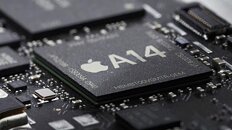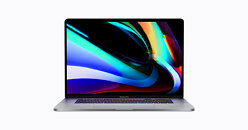Thursday, April 23rd 2020

Apple Rumored to Launch New Mac in 2021 with 5 nm A14 SoC, x86 no More
In a recent report by Bloomberg it was revealed that Apple is planning to start selling Mac computers featuring their upcoming in-house A14 ARM chip which will power the next generation iPhone & iPad in 2021. According to sources familiar with the matter Apple is developing three new processors based on the A14 to power some 2021 Mac products, these chips will be manufactured on TSMCs 5 nm process. One of these new processors is expected to be more powerful then the iPhone version.
This marks a significant move for Apple as they shift from x86 to in-house ARM designs across their entire product lineup, we have an editorial on the rise of ARM here. This development is part of Apple's plan to increase control over their products in an attempt to fully unify the Apple ecosystem and reduce reliance on Intel who has struggled to offer significant performance increases in recent years, this will come as a major blow to Intel who benefited greatly from Apple's demand. Apple will need to adapt MacOS for an ARM based design and ensure their is compatibility for third party x86 applications. The first processor is expected to feature 8 "Firestorm" cores and at least four energy-efficient "Icestorm" cores, Apple is also exploring options for up to 12 core processors based on the same design for use in future Macs.
Source:
Bloomberg
This marks a significant move for Apple as they shift from x86 to in-house ARM designs across their entire product lineup, we have an editorial on the rise of ARM here. This development is part of Apple's plan to increase control over their products in an attempt to fully unify the Apple ecosystem and reduce reliance on Intel who has struggled to offer significant performance increases in recent years, this will come as a major blow to Intel who benefited greatly from Apple's demand. Apple will need to adapt MacOS for an ARM based design and ensure their is compatibility for third party x86 applications. The first processor is expected to feature 8 "Firestorm" cores and at least four energy-efficient "Icestorm" cores, Apple is also exploring options for up to 12 core processors based on the same design for use in future Macs.


10 Comments on Apple Rumored to Launch New Mac in 2021 with 5 nm A14 SoC, x86 no More
Either TSMC made a custom node available to Apple, or Apple outdid itself which is true by default.
I do music production on an iPad mini 2, and while I was skeptical at first, it did surprise me a lot, on every aspect: software availability for music prod, performance, sound quality, etc.
I just keep my windows desktop computer for the rest, like FL studio and so on.
But anyway... Unless that apple chip has some kind of x86 extensions (which would need the signing of an agreement to do so) or some kind of emulation layer (slower performance), I don't think it will be strong enough to replace a x86-64 chip.
Its all about costs too, having a powerful chip available in house would be much cheaper to include in a mac computer, much cheaper than including an intel chip. Way more cheaper. However, I would go Ryzen if that was the case.
So before this topic goes too far one way or the other, whether you like Apple or you don't, you should give them some respect for their massive undertakings and what they accomplished with their move from the AIM/powerpc/macOS realm to X86-64 and everything in between....
Yea I know they have made some really dick moves during that transition and in recent years, but still, they endured through all of it and have become a massive commercial & financial powerhouse, all while losing several key people from the early years, as well as their co-founders and ceo....
And having had past experience with Apple's hardware & software ecosystem, I know that, just like the Russians in The Hunt For Red October, "they don't take a dump without a plan" ..;)..:laugh:..:eek:
So hold onto your hats, 'cause when this change happens, you won't wanna be caught without one....
Or maybe not. Apple could say "screw the customer" (they've done it in the past) and swap the entire next generation to ARM. We'll see.
So every once in a while, some journalist or investor who doesn't know that comes in and speculates and creates another round of rumors. Happens at least twice a year.